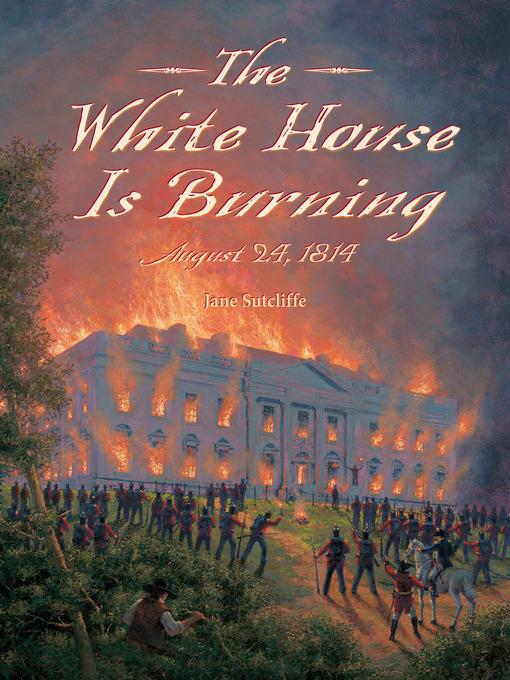
The White House Is Burning
August 24, 1814
فرمت کتاب
ebook
تاریخ انتشار
2014
Lexile Score
960
Reading Level
5-6
ATOS
7
Interest Level
4-8(MG)
نویسنده
Alexander Farquharsonناشر
Charlesbridgeشابک
9781607345442
کتاب های مرتبط
- اطلاعات
- نقد و بررسی
- دیدگاه کاربران
نقد و بررسی

July 1, 2014
Gr 4-7-Sometimes referred to as "America's Second Revolution," the War of 1812 found British forces invading the newly founded capital city of Washington, DC. Following the Battle of Bladensburg and the embarrassing retreat of the U.S. militia, the British arrived at the capital during the most oppressive weather conditions imaginable to find the city largely abandoned. In this hour-by-hour narrative, Sutcliffe provides a harrowing account of the day, culminating with the burning of both the Capitol building and the iconic White House, the flames of which could be seen as far away as Baltimore. Extensively researched and thorough in coverage, this book gives readers a full view of this compelling story and the events leading up to the conflict. The title is enhanced by the original maps, portraits, paintings, and drawings of key personalities. Sutcliffe's use of primary sources is impressive as she weaves together a seamless tale from a variety of perspectives. The author draws upon firsthand accounts from a variety of sources (respected military personnel, political figures, everyday citizens, and slaves) to provide an impartial, well-rounded look at this pivotal day in our nation's history and its aftermath. Certain to spark interest in history aficionados, this title would be a welcome purchase for most collections.-Rebecca Gueorguiev, New York Public Library
Copyright 2014 School Library Journal, LLC Used with permission.

June 15, 2014
A graceful narrative skillfully draws from primary sources to shed light on a key historic day.In 1814, the United States lost a battle to the British on the outskirts of Washington, D.C., with shocking results. American soldiers fled from the battlefield, and many residents of the capital fled from the city. "Then the unthinkable: foreign invaders marching into Washington, torching first the Capitol building, then the White House," reads the introduction to this history. The chapters that follow detail the day, starting before dawn and going through night, with two final chapters about the aftermath. Sutcliffe deftly sets the battle and invasion in the context of the War of 1812, introduces major players, and explains unfamiliar material, like the use of rockets as weapons. Quotes from those involved make the tale personal, with reminiscences of a 15-year-old tourist, two young slaves and a British officer. Many apt observations come from first lady Dolley Madison, who wrote a letter throughout the day as she waited bravely in the White House until danger was imminent. The polished prose is matched by an attractive, open design with frequent headings, pullout quotes and effective visuals, including paintings, etchings and maps.Elegant and illuminating. (source notes, bibliography, index) (Nonfiction. 10-14)
COPYRIGHT(2014) Kirkus Reviews, ALL RIGHTS RESERVED.

September 1, 2014
Grades 5-8 In the summer of 1812, the young U.S. was at war with Britain once again. Refusing to believe reports of an imminent British attack on Washington, the Secretary of War did not call out the militia. Meanwhile, a Royal Navy admiral received orders not to attack, but bent on revenge, he decided to ignore his orders. With rumors flying, citizens fled the capital. Among the last was the First Lady Dolley Madison, who escaped shortly before the British took the city and burned the White House, as well as other public buildings and private residences. Well researched and logically organized, Sutcliffe's narrative is enriched by quotes from period letters, journals, and accounts written by Washington residents, military men on both sides, Dolley Madison, and Paul Jennings, a slave. The well-chosen period illustrations, reproduced in color, are both useful and attractive. Sutcliffe does a good job of representing the thoughts, emotions, and reactions of those on both sides of the conflict. A solid addition to American history collections.(Reprinted with permission of Booklist, copyright 2014, American Library Association.)

























دیدگاه کاربران